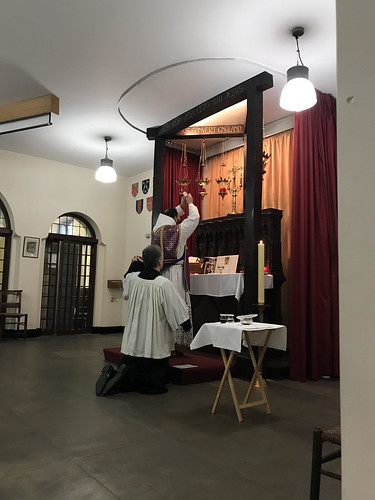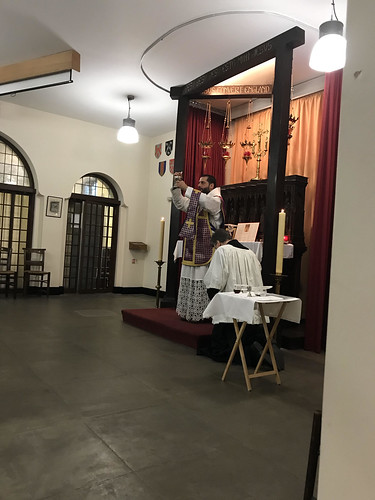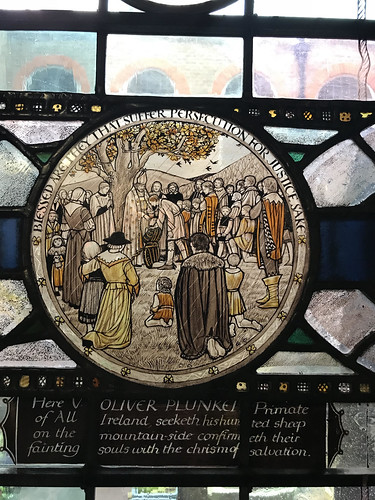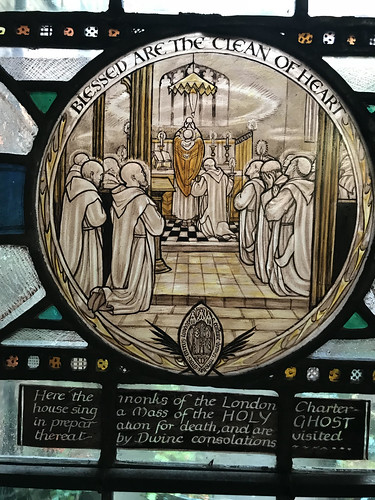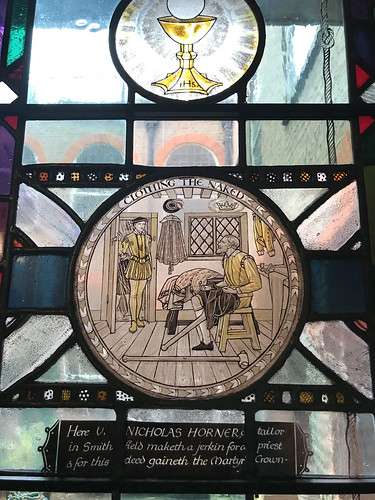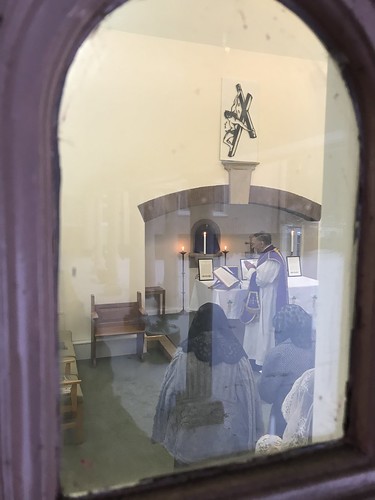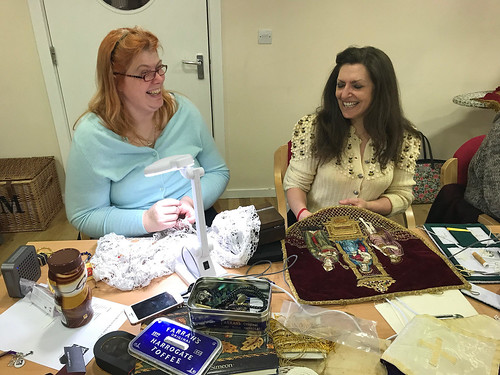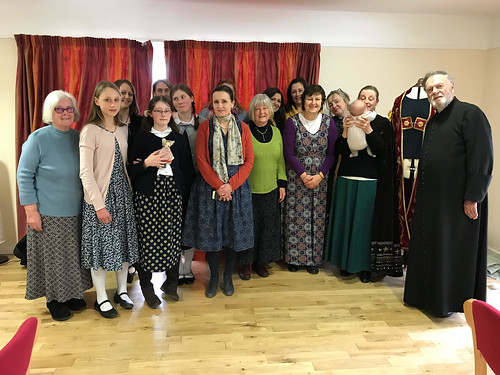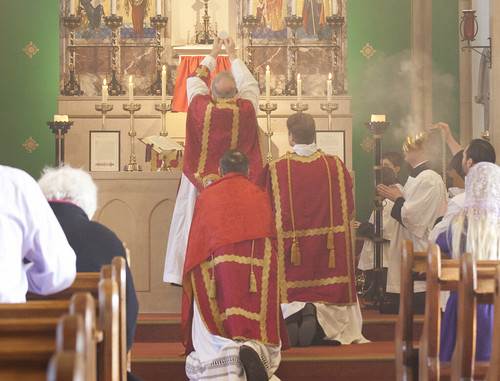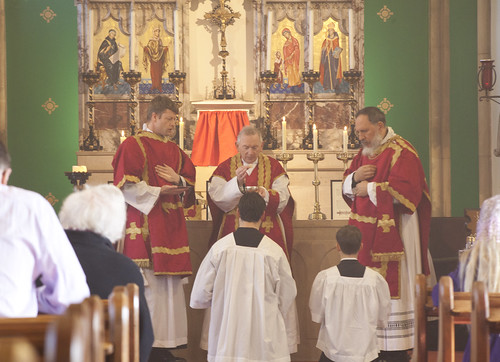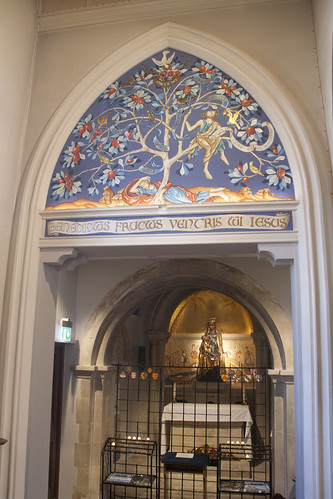Chairman's Blog
Mass in Tyburn last Saturday
Last Saturday a Traditional Sung Mass was celebrated in the Relic Chapel of Tyburn Convent in London, by Fr Serafino Lanzetta. It was celebrated with Low Mass ceremonies, and just one server, accompanied by two singers. This Mass was sponsored by the Latin Mass Society.
The occasion was a youth conference organised by the Catholic Medical Association (and on Facebook), on the subject of conscience. I gave a talk, as did John Smeaton of SPUC and s sister of the convent. Fr Lanzetta gave a sermon on the same subject.
It was a great privilege to hear Mass in this place, where so many relics of the martyrs can be seen. There are also some lovely stained glass windows showing episodes from their lives, illustrating for example the Corporal Works of Mercy. I love the rain in the above panel, showing St Oliver Plunket giving the sacrament of Confirmation on a hillside.
Above the Carthusians celebrate Mass before finally defying Henry VIII by refusing the swear the Oath of Supremacy, which denied the authority of the Pope.
The chap above, Bl. Nicholas Horner, was a tailor. The crime for which he died was making a doublet for a priest, contravening the law against giving comfort and assistance to priests. He had already lost a leg because of the chains he endured during a previous period of imprisonment.
Support the work of the LMS by becoming an 'Anniversary Supporter'.
The Traditional Mass returns to Holy Trinity, Hethe
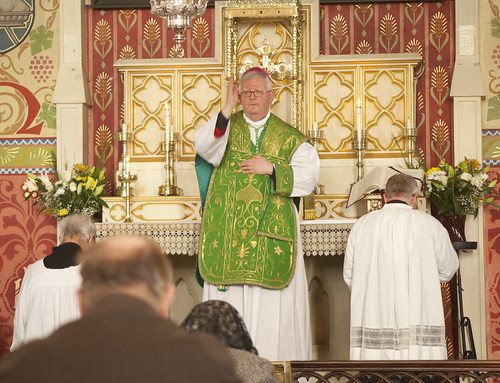 |
| Archbishop Bernard Longley celebrated Pontifical Low Mass in Holy Trinity in January 2017 |
I am pleased to be able to announce that thanks to the good will and hospitality of the Archdiocese and of the Parish Priest, Canon John Batthula, the Traditional Mass will once again be celebrated on Sundays at Holy Trinity, Hethe.
Holy Trinity Church is outside Bicecester: Hardwick Road, Hethe OX27 8AW. (Map)
Support the work of the LMS by becoming an 'Anniversary Supporter'.
Do we want to solve the problem of sacrilegious Communions?
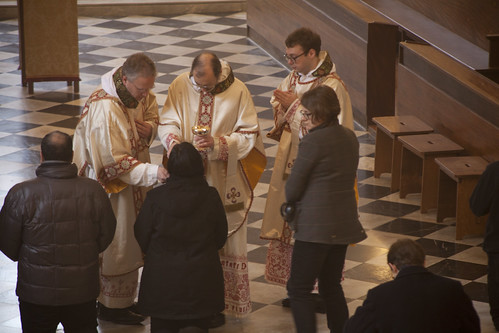 |
| Holy Communion at a High Mass in the Domincan Rite at Oxford's Blackfriars |
Sometimes people like to complain about problems but do not, really, want to solve them. If you offer a solution, they are uninterested, or even angry. The problem is important to them. It may even be a way for them to get something they want: perhaps to extract a concession from someone. So I ask: does anyone (anyone in authority) actually want to solve the problem of sacrilegious communions?
Pope John Paul II pointed out the problem way back in 1980 (Dominicae Cenae):
The situation is now vastly worse than in 1980. Many go without real reflection. Others, who might be thinking about how they ought to go to Confession first, find it embarrassing or even physically awkward to avoid going up too. It has become a common attitude that if you don't go to Communion, you've not been to Mass properly: you've not fulfilled your obligation. And all this is to say nothing of the problem of those who feel excluded, or the priests who feel they need to exclude them, because of notorious public sin, a problem which is the root of the greatest crisis in the Church, according to some, since Arianism, and which is threatening to cause a schism.
As a matter of fact there is a perfectly straightforward solution, which doesn't require any change to the Church's teaching about Marriage, or sacramental discipline about public sinners. Nor does it require priests to enforce brutal and (to many church-going Catholics) incomprehensible restrictions on the reception of Communion. It requires a liturgical practice which is not so problematic that it has not in the past been permitted over many years and over widely varying social conditions.
Here how it works. The problem of sacrilegious communion, and the related problem arising from the theoretical obligation to prevent at least one category of these at the Altar rail, arises largely because of the very public nature of the reception of Communion in our churches today. Although people generally no longer dress up for it, it is a parade. If we take that element away, we have greatly ameliorated the problem.
What I am referring to is the practices surrounding Holy Communion which were universal in the Church for a number of centuries up to the 20th century. Since they died out at the outer limit of today's living memory, between the two World Wars, people may be surprised to hear what they were.
1. Communion is not commonly distributed during Mass. It is distributed before, after, or between Masses, or on application to the parish priest.
2. Liturgical participation in Mass is focused not on the reception of Holy Communion but on witnessing the newly-consecrated Host and the Chalice, which are surrounded with as much solemnity as possible, enriched with indulgences, and so on.
If Holy Communion is not distributed at Mass after the priest's Communion then reception ceases to be a public act. The whole question of what people will think if you do or do not join the queue with everyone else disappears. People may still receive Holy Communion in groups at the Altar Rails, of course, but they do not do so in front of the entire congregation.
The older practice is not the most ancient practice. It was discouraged under the influence of the Liturgical Movement which sought to re-integrate Holy Communion into Mass where, it was felt, it belonged, from a ritual point of view, and also to make the Sacrament of Communion a more appropriately communal act. I don't have any particular disagreement with the arguments in favour of having the Communion of the Faithful in Mass, but they are clearly not arguments of infinite weight. Other things being equal it makes more sense, perhaps. But now we are facing a major crisis: the situation is one not remotely anticipated by the liturgists of the early 20th century. Reversing this particular well-meaning reform should be a no-brainer.
An incidentaly aspect of the re-insertion of the Communion of the Faithful into Mass was making impossible the singing of many of the settings of the Agnus Dei which were composed during the period when it wasn't there. These could be very long: they weren't interupted by the Communion of the Faithful, and sometimes included the Communion Antiphon at the end.
If, that is, we are in the business of finding solutions. Those who want to give the growing crisis the fuel it needs to create some kind of explosion in the Church, some kind or volcanic eruption where the theology of marriage and sacramental discipline, the reality of the Blessed Sacrament and even the authority of the Papacy are all imperilled: well then we should definitely keep things as they are.
Support the work of the LMS by becoming an 'Anniversary Supporter'.
Guild of St Clare Sewing Retreat success
There was a moment -- well, more than a moment -- when I thought the sewing retreat was not going to happen last weekend. The snow, which started falling during the week before, starting falling again on Friday afternoon, and the final approach to the Retreat Centre up a steep hill became impassible to all but four-wheel-drive vehicles. Luckily we worked out an alternative route, and the great majority of the retreatants made it. Only a few perished in the snow (only kidding!)
From the Guild: The Guild of St Clare held its second Sewing Retreat in the teeth of the Beast from the East last weekend. The Carmelite Retreat Centre, where it took place, is in a delightfully rural location, at the top of Boars Hill. The roads were untreated, and retreatants defied the blizzard and the snowdrifts to make their way finally to the peace of sewing, spiritual conferences and, most importantly, the traditional liturgy.
Fr John Hunwicke, chaplain to the Retreat, gave a series of talks on types and anti types in the Old and New Testaments in relation to Lent and Easter, celebrated daily Mass, and led us in Benediction and Compline. 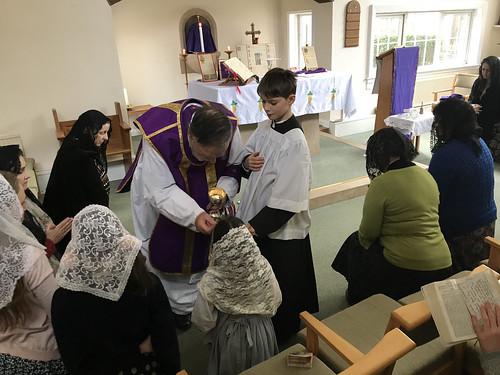
The retreatants worked unstintingly on the various vestment repairs, and achieved an astonishing amount, including replacing worn-out orphreys on a chasuble, reattaching fringe and clasps to a red and gold cope, re-making maniples and a burse, and repairing the nineteenth century handmade bobbin lace on an alb.
Mending these often very beautiful vestments, which will be used in celebrating the Holy Sacrifice of the Altar, is to assist at Mass in a tangible way; it is a reward in itself. It's no wonder that the retreatants form such a happy community while working together on them. Many thanks to everyone who braved the weather to take part. Next year's retreat will take place on the first weekend of February. Bookings will open shortly on the LMS website.
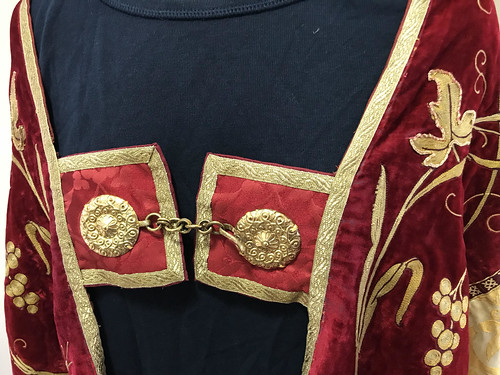 |
| New clasps on this cope: the tabs the clasps are one are also new. |
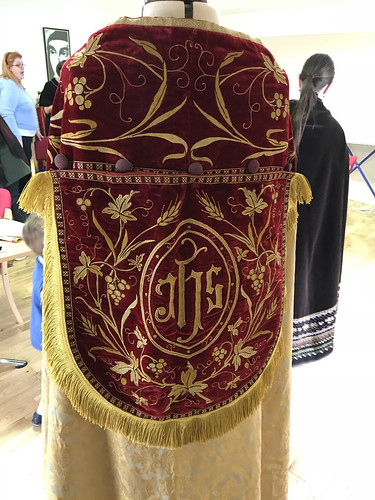 |
| The is the new fringe on the back of the same cope. |
Support the work of the LMS by becoming an 'Anniversary Supporter'.
FIUV Magazine relaunched
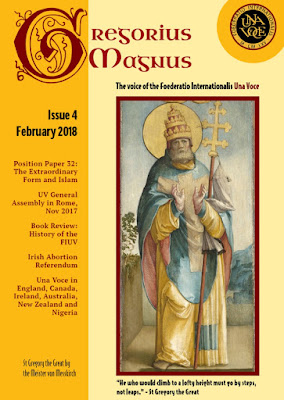
Cross-posted from Rorate Caeli.
I have pleasure in presenting the new edition of the quarterly magazine of the Foederatio Internationalis Una Voce (Una Voce International), Gregorius Magnus: the 4th edition.
It can be downloaded as a pdf here:
• Position Paper 32: The Extraordinary Form and Islam
• UV General Assembly in Rome, Nov 2017
• Book Review: History of the FIUV
• Irish Abortion Referendum
• Una Voce in England, Canada, Ireland, Australia, New Zealand and Nigeria
Support the work of the LMS by becoming an 'Anniversary Supporter'.
Book review: History of the FIUV by Leo Darroch

This review is in the current edition of the Latin Mass Society's magazine Mass of Ages. Cross posted from Rorate Caeli.
Una Voce: the History of the Foederatio Internationalis Una Voce 1964-2003, by Leo Darroch (Gracewing; 467pp)
Buy it from the LMS bookshop, Amazon.co.uk, or Gracewing
Support the work of the LMS by becoming an 'Anniversary Supporter'.
The Gospels of the first three Sundays of Lent
 |
| St Paul |
Peter Kwasniewski has an excellent discussion of the contrast between the Epistles (first readings) of the first three Sundays of Lent given us by the ancient Lectionary, and the Second Readings of Sunday Mass, usually Pauline Epistles, offered us by the 1969 Lectionary. Since there are three years of readings in the Ordinary Form there are nine passages to compare with the three of the EF. Not one of these nine passages so much as mentions the major theme of all three of the EF's selections: the importance of repentance from a sinful lifestyle, above all in relation to sexual sins.
So concerned were the compilers of the reformed Lectionary to avoid mentioning sin that they even cut out of the passages bits where the subject came up.
It is a nice illustration of a major strand of what happened in the Catholic Church when the reforms following Vatican II were implemented. Consider this, a passage commenting on yesterday's Epistle by Mgr Patrick Boylan (The Sunday Epistles and Gospels) which had its Imprimatur in 1941.
If there are among us Catholics, apparently convinced and genuine, who seek to minimise the sinfulness of unchastity, or the danger of its occasions, let us not be deceived by their words, nor follow their example. On all sides one hears voices raised against every attempt to check the growth of profligacy, every effort to restrict evil amusements and evil literature. We hear constantly of the 'sacred rights', of freedom--freedom, that is, to disregard the moral code, to follow the blind guidance of passion, to satisfy every form of curiosity, so see everything, to read everything. Popular literature is full of the 'empty words' [St Paul's phrase] with which all that is seductive to sense is represented as innocent because it is 'natural', or 'healthy', or because it 'develops the personality'!
Boylan, and no doubt the majority of his clerical and pious lay readers, was acutely aware of the ferocious assault which was being carried out against traditional sexual mores, a full twenty years before its hideous triumph in the sexual revolution of the 1960s. St Paul's exhortations were exactly what was needed at that time.
It was the moment when things were getting really, really bad--when a bad case of the common problem of all young people since time immemorial was turning into a social revolution which would permanently destroy the expectation of the permanency of marriage and of children being raised by their biological parents--that was the moment when the reformers chose to bury St Paul's message.
Everyone in the West in the middle decades of the 20th century was aware of the increasing gulf between the Catholic Church and the maxims of the world. Everyone was aware that Catholic communities, teachings, culture, and institutions were as a tightly-integrated group the last major refuge of a traditional Christian attitude.
It was for the Second Vatican Council to decide how to address this problem, and the path chosen, as far as anyone could tell through the confusion and chaos, was the path of appeasement. The consequences tell their own tale.
Support the work of the LMS by becoming an 'Anniversary Supporter'.
Letter on older Traditionalists, in the Catholic Herald
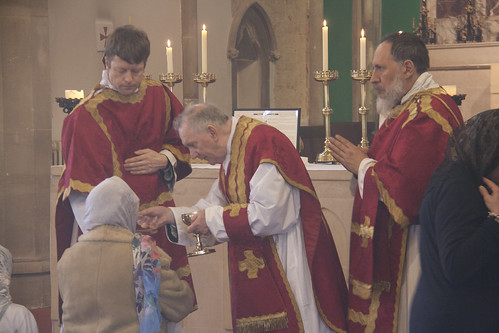 |
| The LMS Pilgrimage to Our Lady of Caversham last weekend. |
Today the Catholic Herald has published my letter answering Michael Davis (not to be confused with the late Michael Davies), who criticised the older generation of Catholics attached to the Traditional Mass.
I have written a blogpost about his article here.
Michael Davis’s attack on the ‘older generation’ of Traditional Catholics (Comment, 16th Feb) misses the mark. The tone of the mainstream lay movement for the preservation of the Traditional Mass, represented by the Latin Mass Society and it sister organisations around the world, was set by men like Dietrich von Hildebrand and Eric de Saventham, both of whom risked their lives for their opposition to Hitler; Hamish Fraser, a convert from Communism; and Hugh Ross-Williamson, deselected as a Labour parliamentary candidate for being too left-wing. The extraordinary devotion of Traditional Catholics to the Papacy, over decades when they received little but hard knocks from the hierarchy, prevented them from taking the easy option of leaving the structures of the Church. Now that their central argument has been vindicated—the ancient Mass was never abrogated—we can see that their obedience to the bishops of their day was supererogatory.
The Traditional Movement today, as Davis notes, contains many young people. Through no fault of their own, a great many come from broken homes, and nearly all from homes where the Faith was scarcely practiced, if at all. They have grown up seeing Tradition vilified, and its rebellious image has proved attractive. If you want to shock ‘boomer’ parents, a mantilla may be more effective than cannabis.
Fortunately, the Traditional Movement has something they not only like—the ancient Mass—but which is an objective channel of grace. It takes seriously the issue of sin. And it hasn’t driven away the older age-groups who can provide example and guidance.
We value the older generation of Catholics attached to the Traditional Mass for their fidelity, for their generosity, for their experience and their wisdom. Of special importance are those who can remember how it was when Tradition was normal: when to be a Traditional Catholic was simply to be a Catholic. I will miss them when they are gone.
Davis mentions the principle that we are obliged to respect our parents. On the basis of this principle I suggest he owes an apology to his often heroic predecessors in the movement for the Traditional Mass.
Yours faithfully,
Joseph Shaw
Chairman, the Latin Mass Society
Support the work of the LMS by becoming an 'Anniversary Supporter'.
Position Paper on the Sanctoral Cycle

Today I publish the last of the FIUV Position Papers: The Sanctoral Cycle of the Extraordinary Form. Go over to Rorate Caeli to read it.
Researching the calendar, specifically the cycle of saints' days, has been very interesting. It has underlined how reletively empty of saints the 1969 calendar is (although the Novus Ordo it has picked up a few more over the decades since then). If you go to a weekday Mass in the Novus Ordo, the priest will more often than not be wearing green, during 'Ordinary' time, or violet in Advent or Lent, or white in Paschal time: the colour of a 'ferial' day, when no feast is being celebrated. I have heard of this being taken even further, and a preference for the ferial Mass taking over even on days when according to the rule there should be a saint. But in the Traditional Mass ferial Masses are downright rare. On the few days each week when there is no saint to celebrate, priests tend to say a Votive Mass.
It is important to understand the rationale behind this preference for ferias. In the EF a succession of ferial Masses would mean a succession of celebrations of the Mass of the previous Sunday (without the Gloria or Creed). Doing this sometimes can be nice, and occasionally the Mass of the previous Sunday may not have been celebrated on the Sunday (for example, the First Sunday after Pentecost is always replaced by Trinity Sunday). But doing this every day of the week would be a bit odd. For those who attend the Traditional Mass either every day or one or two days in a week, Masses are distinguished from each other by the saints and by the Votives chosen by the celebrant. On Fridays we tend to get the Mass of the Sacred Heart; on Wednesdays the Mass of St Joseph (a Mass formulary which isn't used elsewhere in the year, for historical reasons); Our Lady on Saturdays; and so on: these are devotions which will often be marked by statues or side-altars in traditonally-decorated churches. The saints and the Votives slot into our devotional lives: we can read up about the saints and prat to them, we can engage with the devotion celebrated in the Votive Mass. As you become used to the EF, it all slots together.
It is not so in the EF. Why? It was not an accident: Archbishop Bugnini said the fuss about the reform of the sanctoral cycle came from people who had a 'devotional attitude' to the liturgy. He thought that a devotional attitude to the liturgy was wrong. It wasn't, he thought, truly liturgical, and it wasn't truly scriptural. It had to be stripped away to reveal the bare reality of the Mass, like a modernist building with all the pipes showing. On the one hand the worshipper was not to be distracted, more than necessary, by devotions, from the action of the Mass itself. On the other hand, the liturgy would day by day introduce him to reams and reams of scripture, through the 'lectio continua' Lectionary: a Lectionary which, particularly in weekday Masses, plods through the books of both Testaments page by page (leaving out the odd embarassing bit, of course).
As someone who for periods of my life attended daily OF Masses I'd say that the reformed Lectionary does to an extent give one's liturgical experience a both continuity and difference: the readings of today's Mass will very probably continue the story or exhortation or whatever it is of yesterday's. Indeed, the more obscure readings are easier to understand if you've been keeping up. But the saints are rather left out of it. Even when they are celebrated, and the priest is wearing the red of a martyr or the white of confessor, the lectio continua will probably carry on, however innappropriate the reading may be to the saint whose day it is.
I leave it to others to defend the Novus Ordo in more detail. I hardly it necessary to defend the Traditional practice. It is just obvious to those who attend it that the traditional approach, which has been the Church's approach since the early centuries, feeds the spiritual lives of those open to it. The saints are not a distraction from Mass: they accompany us in it, and draw attention to its glories, since it was by it that they were themselves sanctified. The devotions of Massgoers and of the Votive Masses themselves point to Christ present in the liturgy as Our Lady points to the Christ-child in a thousand Rennaissance masterpieces. Why is St Joseph important? Why do we celebrate lots of Votive Mass of Our Lady? Because of their role in relation to Christ. And so it is with every authentic traditional devotion.
I hope this Position Paper, the last (at least
for now) in the series, will help those who are and also those who are not familiar with the Traditional Mass to understand it better, and appreciate it more.
Support the work of the LMS by becoming an 'Anniversary Supporter'.
LMS Pilgrimage to Caversham 2018
On Saturday the Latin Mass Society went on pilgrimage to Our Lady of Caversham, which is always very edifying. It was interesting to see, this year, improvements to the shrine, with a new painted backdrop to the shrine image.
The Pilgrimage usually coincides with the Ember Saturday of Lent: not all pilgrimages can take place in the summer, and the Ember Saturday is something well worth celebrating in a solemn way. However, the Ember day was only commemorated this year, because it was the feast of St Matthias.
St Matthias was chosen, between Ascension and Pentecost, to replace Judas: when the Holy Ghost descended upon them, there was a full complement of Apostles. However, representations of the 12 Apostles tend to leave him out to make room for St Paul, so he can be neglected.
We didn't neglect him this year, however, with a splendid High Mass, celebrated by Fr Anthony Conlon, assisted by Fr James Mawdsley FSSP (deacon) and Fr Gabriel Diaz (subdeacon), and accompanied by the Schola Abelis (chant) and the Newman Consort. The Newman Consort sang John Taverner Kyrie Leroy, Thomas Tallis Mass for Four Voices, and Noel Bauldeweyn Ave caro Christi cara, all of which were lovely.
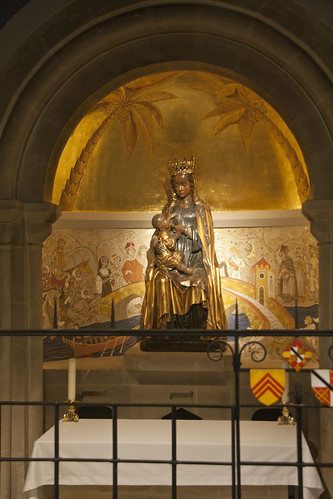 |
| (This is what it looked like last year.) |
This year we had a buffet lunch in the parish room, which was extremely jolly and which we will certainly do again.
With thanks to Mgr Patrick Daly, the parish priest and shrine custodian.
Support the work of the LMS by becoming an 'Anniversary Supporter'.

